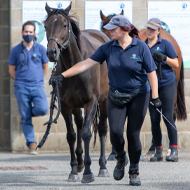Webinar to explore 'the whole horse approach'

World Horse Welfare's popular equine webinar series launches with a talk on how owners and equine professionals can work together to support horses.
A popular equine welfare webinar series is set to make its return on Wednesday (26 January), kicking off with a discussion on ‘the whole horse approach’.
The series, organised by equine charity World Horse Welfare, will explore all aspects of horse care and management, launching with a look at how owners and equine professionals can work together to support horses.
A team of equine health professionals will explain how to work collaboratively to treat the horse as a whole, detailing how owners can be confident that the professional they are using is the right one for them.
Vet Lucy Grieve will then guide listeners through the types of allied professionals that may be chosen to treat horses and the central role of the vet. She will be joined by chartered and veterinary physiotherapist Kate Stephens, farrier Rebecca Lowe AWCF and equine dental technician James Arkley.
Speakers will discuss how their roles complement each other and highlight what owners and carers should consider when choosing an equine specialist. Finishing with a Q&A session, the panel will also discuss what checks should be carried out before allowing someone to treat a horse.
The webinar is free to attend and takes place over Zoom at 7pm, although it can also be viewed as a Facebook live session. For more information and to register your place, visit worldhorsewelfare.zoom.us



 The Animal and Plant Health Agency (APHA) has updated its online reporting service for dead wild birds.
The Animal and Plant Health Agency (APHA) has updated its online reporting service for dead wild birds.